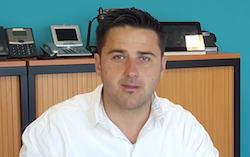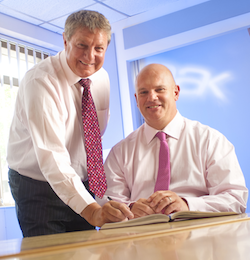 Here, we talk to Gamma's Hosted Sales Specialist Sean Blackmore to explore how resellers can maximise the business opportunities during this year's peak buying time in the education sector.
Here, we talk to Gamma's Hosted Sales Specialist Sean Blackmore to explore how resellers can maximise the business opportunities during this year's peak buying time in the education sector.
Striking the right technology balance for schools and colleges, addressing three key concerns while demonstrating value are the keys to unlocking a market ripe with upgrade opportunities this year, believes Blackmore. "The main concerns for ICT buyers in schools and colleges are resilience, safety, and efficiency," he stated. "This sector is generally cost conscious so ICT solutions need to address these priority areas and hit the right price point. For schools and colleges, buying technology is less about solving problems and more about improvement, streamlining, being more efficient and safer. And resellers must make a proper assessment of these requirements."
Blackmore noted that schools and colleges are more receptive to the idea of investing in the right infrastructure, providing their three main priorities are met. "If this can be achieved at the right price then 2017 will be the year that educational establishments make the move from legacy systems and embrace new technology - so long as value is demonstrated," he added.
A big trend in schools is the rise of parent-teacher contact. Many schools offer parents the opportunity to have regular catch-ups with teachers to check on the progress of their children. By integrating a PC and CRM with a phone system a teacher is able to call parents via click-to-dial and log the topics of conversation in the CRM system. Call recording can also be used to record important parts of the conversation.
"The methods of contacting teachers are also expanding," added Blackmore. "For example, a teacher could be accessed via a soft phone application that supports chat. Or, should they not be at their desk phone, if a voicemail is left they can still pick it up providing the phone system supports voicemail to email. Alternatively, when the teacher leaves the classroom they can turn on mobile twinning, making them available on their mobile while on a school trip for example. These are just some examples of how schools are starting to embrace technology."
For resellers, the education sector also offers exciting upgrade opportunities for solutions such as a 'safety package' that can be sold as a bolt-on and act as a differentiator when compared to a reseller taking a one-size-fits-all approach. "Schools and colleges are placing a strong emphasis on practical applications, efficiency and productivity, and investing in technology helps them to advance this agenda," commented Blackmore. "In the past school administrators embraced technology to send emails to parents rather than give them printed letters to take home, meaning messages cannot be lost while saving on costs. The same is happening nowadays with telephony.
"Administration teams also see the benefit of an easy to use portal that enables them to make changes should there be an unexpected requirement. Having these conversations with end customers who accept the benefits, and not just make a decision on price, are the biggest education sector opportunities."
In terms of the size of the opportunity, academies stand out as having more budget to spend, sometimes up to 10 per cent more from receiving funds for support services that used to go to local councils. "This means that many have more capital available for investment in technology and we have seen them adopting Gamma's hosted phone system, Horizon," added Blackmore. "We are making Horizon a more vertical oriented product. Rather than a one-size-fits-all approach we have developed a proposition for six verticals, one of them being education, and produced a range of white label marketing material to support our partners in positioning these solutions to the relevant verticals. We can only see this trend continuing."
The main challenges faced by resellers addressing the education sector are cost and striking the right balance between 'overkill versus not enough'. "An all-singing and all-dancing proposition might put resellers out of contention when speaking to a school," he explained. "However, other products may be more affordable but lack the required security or resilience that a school needs. Finding the right balance has always been a challenge for resellers.
"But for those resellers who get it right a shift in the mindset of buyers in schools and colleges will ensure that this market sector continues to grow and present opportunities. At one time technology was viewed as a cost with no real benefits to an educational institute, now it is seen to improve efficiency and safety and deliver cost benefits."

 Technology is reshaping the education sector and pushing the limits of learning and its delivery. Here's how one channel partnership is harnessing full fibre to remodel the future of education.
Technology is reshaping the education sector and pushing the limits of learning and its delivery. Here's how one channel partnership is harnessing full fibre to remodel the future of education. Andy Nash (pictured left), Head of Public Sector at CityFibre, noted that the alternative provider has been supplying dark fibre connectivity via its partners to a growing number of universities over the past year. "Demand is driven by the need for higher bandwidth of course, but it's additional benefits such as multiple fibres and full control over scalability for the future that really influence the decision making process," he explained. "We're also seeing more local authorities choosing to include schools in their procurements irrespective of the academisation programme."
Andy Nash (pictured left), Head of Public Sector at CityFibre, noted that the alternative provider has been supplying dark fibre connectivity via its partners to a growing number of universities over the past year. "Demand is driven by the need for higher bandwidth of course, but it's additional benefits such as multiple fibres and full control over scalability for the future that really influence the decision making process," he explained. "We're also seeing more local authorities choosing to include schools in their procurements irrespective of the academisation programme." Optimising the sales operation in a fast growing channel business is no easy task, but Virtual1 Sales Director Jason King has approached the challenge with all his skills as a strategist and business transformer. Here, he also reveals the passions that drive his sales leadership.
Optimising the sales operation in a fast growing channel business is no easy task, but Virtual1 Sales Director Jason King has approached the challenge with all his skills as a strategist and business transformer. Here, he also reveals the passions that drive his sales leadership. What's the channel's priority now? Not reacting passively to cyber attacks but doing everything possible to stop them happening, urges Steve Nice, Chief Security Technologist at Node4.
What's the channel's priority now? Not reacting passively to cyber attacks but doing everything possible to stop them happening, urges Steve Nice, Chief Security Technologist at Node4. Philip Carse, Analyst at Megabuyte.com, reports on the recent performance of leading companies in the comms space during the last quarter.
Philip Carse, Analyst at Megabuyte.com, reports on the recent performance of leading companies in the comms space during the last quarter. Centile's renewed focus on the UK channel is playing into the hands of resellers who want to gain control of their own destiny by adopting a PaaS-led and mobile-first approach to market, according to Director General Bertrand Pourcelot.
Centile's renewed focus on the UK channel is playing into the hands of resellers who want to gain control of their own destiny by adopting a PaaS-led and mobile-first approach to market, according to Director General Bertrand Pourcelot. Oak's founders James Emm and Phil Reynolds not only gave birth to one of the comms industry's greatest success stories they also fathered two boys who have followed in their footsteps and are themselves blazing the R&D trail and carving out a niche with Canada-based Oak Systems International.
Oak's founders James Emm and Phil Reynolds not only gave birth to one of the comms industry's greatest success stories they also fathered two boys who have followed in their footsteps and are themselves blazing the R&D trail and carving out a niche with Canada-based Oak Systems International. Last month's Margin in Voice & Data seminar held at the Forest of Arden hotel on June 22nd signalled clearly the need for a new strategic approach to emerging market opportunities and threats, most preferably along the lines proposed by speakers at the event.
Last month's Margin in Voice & Data seminar held at the Forest of Arden hotel on June 22nd signalled clearly the need for a new strategic approach to emerging market opportunities and threats, most preferably along the lines proposed by speakers at the event. Last month's Margin in Voice & Data seminar held at the Forest of Arden hotel on June 22nd signalled clearly the need for a new strategic approach to emerging market opportunities and threats, most preferably along the lines proposed by speakers at the event.
Last month's Margin in Voice & Data seminar held at the Forest of Arden hotel on June 22nd signalled clearly the need for a new strategic approach to emerging market opportunities and threats, most preferably along the lines proposed by speakers at the event. When Terence le Poer Trench, Business Development Manager at Pangea, takes part in this year's RideLondon100, he'll not only be raising money for teenage mental charity stem4, he'll also be gathering valuable IoT data on cycling issues.
When Terence le Poer Trench, Business Development Manager at Pangea, takes part in this year's RideLondon100, he'll not only be raising money for teenage mental charity stem4, he'll also be gathering valuable IoT data on cycling issues.